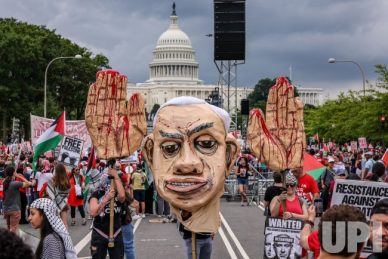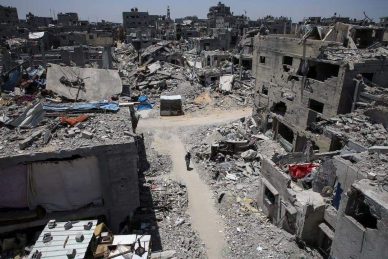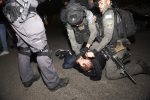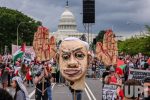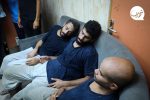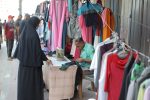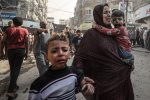GAZA, (PIC)
The exhausted mother, Lubna, wandered among the tents of displaced people in the south of the Gaza Strip, carrying her young daughter, her face filled with confusion and suffering evident in her tired features, seeking someone to help her grind her flour.
Lubna Daloul, a new mother at 32, lives in a tent with her children, without a provider after her husband, Mohammed Daloul, 40, was arrested by the Israeli occupation forces during displacement, leaving her alone drowning in responsibility and difficult tasks.
The beginning of the tragedy
Lubna says, “On October 7, 2023, I was surprised to hear successive explosions as I was preparing my children to go to school, and we were waiting to find out the source of these sounds and their cause until I received a message on the phone announcing the suspension of school. I began following the news to find out what had happened.”
“On the same evening, the Israeli occupation forces (IOF) began shelling various areas of Gaza, and the residents of the Zaytoun neighborhood (where Lubna and her family live) began to flee to schools because their homes are close to the border,” according to her account to the Palestinian Center for Human Rights.
On 13/10/2023, the IOF distributed flyers urging people to head south, where Lubna and her family saw their neighbors leaving the neighborhood, but her husband chose to stay at home because they didn’t know anyone in the southern areas, in addition to her being pregnant and having young children, so where could they go with them?!
Lubna added, “On the morning of 30/10/2023, my son Malik, 9, and I went out to fetch some necessary items from around the house, and at the same time an Israeli aircraft targeted the nearby Yassin family’s house with several missiles, and the place was filled with smoke and rocks rained down on us.”
The mother describes her son’s condition, saying, “My son started screaming, but I couldn’t see him at first because of the intensity of the smoke and dust, so I thought he was scared, and I tried to comfort him as I attempted to hold him close to my chest, but I found his face covered in blood, and his right eye was out of its socket.”
At this point, the desperate mother rushed her son to Al-Shifa Hospital, where she learned from the doctors that shrapnel had entered his eye, and after necessary X-rays, he was transferred to the eye hospital, where he underwent surgery. He lost vision in his right eye, but it requires regular cleaning and the application of a special ointment to prevent infection, in addition to the need for it to be covered.
Husband’s arrest
Due to the continued bombing, fire belts, and buildings collapsing on their occupants, and the scarcity and high cost of goods, the mother decided on 01/11/2023 to head to the Falah School, a crowded shelter with a medical point. Lubna says, “We cooperated there to manage our basic needs, especially in providing food and water.”
But being in the shelter did not help them, for on 16/11/2023, while they were inside the school, the IOF began random shelling on the school from its vehicles, resulting in the deaths of dozens, creating a state of tension and extreme fear among the displaced people, who began fleeing the school.
Lubna said, “On 17/11/2023, my husband and his brother decided that we should leave the school and head south, and the destination was Nusairat, where some relatives live. We all got on a horse-drawn cart and reached the Kuwait roundabout, and from there we walked on foot.”
She added, “A large number of people were heading south, and the IOF soldiers were scattered around, and on the edges of the street, there were sand barriers behind which soldiers stood, in addition to tanks and jeeps.”
Lubna described their approach to the safe passage by saying, “My children were with their father, who was carrying the little Maya, and they passed through the safe passage before me, but when I crossed, I couldn’t find him, so I searched among the passersby for my husband and children, but to no avail, and I didn’t find my husband’s brother either.”
Here, Lubna decided to go to her relatives’ house, thinking she would find her family there, but she didn’t find them, so she went to the Nusairat School, run by UNRWA, and was surprised to find it crowded with displaced people, but she refused to leave the school, and she explained to them that she was a stranger and knew nothing about her husband and children, in addition to being pregnant.
Lubna added, “The next day, my husband’s brother came to the school with my children and told me that the IOF had arrested my husband while passing through the safe passage, and they asked him to leave his children and go talk to the soldiers, and suddenly they took him and my children remained in the street, and my husband’s brother saw them sitting on the sidewalk crying out of fear.”
Journey of suffering
Lubna describes how the days began to be very difficult and heavy, as the family breadwinner was arrested by the IOF while she was in the last months of pregnancy, with children in need of care, in addition to her injured child who needs special care after losing his eye. The injury site needs cleaning and sterilization to protect it from contamination that could lead to infections.
As the bombing was intense in Nusairat, with several houses being bombed every day, and entire families being martyred, the woman decided on 10/1/2024 to move to Rafah, helped by her husband’s nephew, who arranged for her pieces of nylon and wood, and made her a small tent to live in with her children.
Describing their difficult situation, she said, “I relied on the food coupon distributed once a month, which consists of canned beans, peas, hummus, and halva, and bags of flour from UNRWA, where I knead and wait for my turn at the bread queue at the mud oven or the firewood available in the (refugee) camp.”
She added, “My eldest son, Mu’tasim, goes daily to the charity to stand in line and wait a long time to bring cooked food for his siblings, which is often lentils, beans, or peas, as I cannot afford to buy gas or even firewood to cook for them due to high prices.”
Here, Lubna suddenly fell silent, leaving her tears that drowned her thin face to express her feelings of misery, pain, worry, and fear, then she said, “I didn’t expect all this suffering to await me, especially after my husband’s arrest, and that my life would turn upside down.”
A smile at the heart of the ordeal
About the birth of her daughter in these circumstances, the mother said, “On 04/02/2024, I began to experience labor symptoms, and although I had gone through this experience before, this time it was the hardest, as I was alone in the tent, and there was no one to support or console me. The pain was severe and continuous, and I felt shortness of breath, and my body was weak due to lack of food, so I couldn’t get up.”
She added, “Suddenly, I screamed loudly, and a woman from the neighboring tent rushed to me and helped me stand up, as I was lying on the sand inside the tent, and there was no mattress to lie on, but I had some blankets distributed by the agency, which I spread for my children to sleep on.”
At this point, her neighbor took her out of the tent and brought a chair for her to sit on, before an ambulance passing by chance stopped to take her to the Emirati hospital in Rafah.
The mother describes the situation then, saying, “We sat in the waiting room of the hospital, crowded with dozens of women experiencing labor pains without the slightest care, and after an hour or more, a bed was available for me to go through the labor stage alone without care or attention.”
Lubna added, “I cried a lot from the pain and from the cold… I cried because I was alone… I cried for my children whom I left alone in the tent… and I cried even more because I didn’t have clothes or diapers for my newborn daughter.”
After the birth, by the will and power of Allah, the mother had to take her daughter Maria and leave the hospital, as there was no waiting, as there were women in pain waiting for an empty bed.
Lubna returned to her tent to embark on a life that is even more difficult and complicated, as she does not have the money to buy milk, diapers, sanitary pads, or even clothes for her newborn daughter.
She said, “My movement outside the tent became difficult to take care of my children, for if I went out, I had to take my daughter, who could get sick due to the cold, weather fluctuations, and inhaling smoke due to burning firewood.”
Lubna continues to communicate with the Red Cross to find out the fate of her husband, whom she eagerly awaits his release to alleviate the burden laid on her shoulders.


